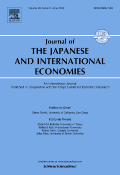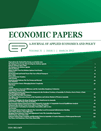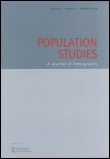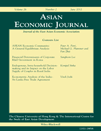
Journal of Demographic Economics
Scope & Guideline
Connecting Dots Between Demography, Economics, and Geography
Introduction
Aims and Scopes
- Demographic Change and Economic Outcomes:
The journal explores how shifts in population structure, such as aging populations, migration, and fertility rates, impact economic performance, labor supply, and social welfare systems. - Intersection of Gender and Economics:
There is a strong emphasis on gender-related issues, including the effects of women's education and labor participation on family dynamics and economic development. - Impact of Migration on Host and Home Countries:
Research is focused on the effects of migration on both the receiving countries and the migrants' countries of origin, including labor market impacts and remittances. - Health Economics and Demography:
The journal frequently addresses health-related topics, examining how demographic factors such as age and gender influence health outcomes and healthcare access. - Socioeconomic Inequality and Demographic Trends:
Papers often analyze the relationship between demographic changes and socioeconomic disparities, looking at issues such as income inequality, access to resources, and social mobility. - Longitudinal and Cross-Country Comparisons:
The journal employs a variety of methodologies, including longitudinal studies and cross-country comparisons, to understand demographic trends over time and their economic implications.
Trending and Emerging
- Migration and Refugee Studies:
Recent publications highlight the effects of migration and refugee status on health, education, and economic well-being, indicating a growing interest in understanding the complexities of migration in a global context. - Gender and Economic Empowerment:
There is an increasing focus on the intersection of gender, education, and economic outcomes, particularly in developing countries, as researchers explore how women's empowerment affects demographic trends. - Health Economics in the Context of Demographics:
Emerging themes include the analysis of health interventions and their demographic implications, such as the impact of maternal health programs on child outcomes in various contexts. - Climate Change and Migration:
An increasing number of studies are addressing the relationship between environmental factors and migration patterns, reflecting the urgency of understanding demographic shifts in the context of climate change. - Social Mobility and Family Dynamics:
Research is trending towards understanding how family structures, socio-economic status, and educational attainment influence social mobility, particularly in relation to changing demographics. - Data-Driven Approaches to Inequality:
The journal is seeing a rise in data-driven studies that analyze the effects of demographic changes on economic inequality, utilizing advanced statistical methods and large datasets.
Declining or Waning
- Traditional Fertility Studies:
There has been a noticeable decline in research specifically focused on traditional fertility studies, such as straightforward analyses of birth rates without the integration of socioeconomic factors or broader demographic contexts. - Single-Factor Economic Analyses:
Papers that analyze economic outcomes based solely on demographic factors without considering the interplay of multiple variables or contextual factors have become less prevalent. - Historical Demographics without Current Relevance:
Research that solely focuses on historical demographic trends without connecting them to contemporary issues or implications for current policy is less common. - Overemphasis on Quantitative Methods:
There is a gradual reduction in studies employing purely quantitative methods without qualitative insights, as the journal increasingly values interdisciplinary approaches and mixed-methods research.
Similar Journals

JOURNAL OF THE JAPANESE AND INTERNATIONAL ECONOMIES
Illuminating the Interplay of Local and Global EconomiesJOURNAL OF THE JAPANESE AND INTERNATIONAL ECONOMIES, a prestigious publication from Academic Press Inc. Elsevier Science, has been a vital contributor to the fields of economics, finance, and political science since its inception in 1987. With an impressive impact factor and recognized within the Q2 category for Economics and Econometrics as well as Finance, and Q1 for Political Science and International Relations, this journal serves as a critical platform for peer-reviewed research that influences both academic discourse and policy-making. The journal is indexed in Scopus, evidencing its prominent position within the scholarly community, with notable rankings of #56 in Political Science and #72 in Finance. Authors and researchers are encouraged to submit their work, contributing to the rich tapestry of knowledge surrounding the economic dynamics of Japan and the broader international landscape. Though it does not offer open access, the journal's subscription model ensures a wide dissemination of its impactful articles, making it essential reading for those aimed at deepening their understanding of economic interrelations and current global issues.

GENUS
Unlocking Insights into Population DynamicsGENUS is a prestigious open-access journal published by SpringerNature, dedicated to advancing research in the field of demography. With an E-ISSN of 2035-5556, it has been operating as an open-access platform since 2016, ensuring that valuable demographic knowledge is accessible to a global audience. Located in Switzerland, this journal contributes significantly to the scholarly community, achieving a remarkable Q1 ranking in the 2023 Scopus category for Social Sciences focusing on Demography, where it stands at an impressive Rank #12 out of 139, placing it in the 91st percentile. With a history that spans several decades, starting from 1970 and including comprehensive coverage from 2007 to 2024, GENUS provides a vital forum for researchers, professionals, and students seeking to engage deeply with current demographic studies. This journal not only publishes cutting-edge research but also facilitates fruitful discussions on key demographic trends and policies, making it an essential resource for anyone interested in the social sciences.

Novedades en Poblacion
Shaping Insights on Social Dynamics and DemographicsNovedades en Poblacion is a pivotal academic journal dedicated to the interdisciplinary exploration of demographic studies, population policies, and social dynamics, published by UNIV HABANA. Since its inception in 2005, this open access journal has provided a platform for researchers, professionals, and students to disseminate and discuss cutting-edge research and findings relevant to populations in Latin America and beyond. With a commitment to high-quality scholarship, Novedades en Poblacion plays a vital role in contributing to the global conversation on demographic changes, migration patterns, and socio-economic impacts on populations. Researchers are encouraged to submit original articles, reviews, and studies that advance the understanding of demographic issues, making it an essential resource for those engaged in the fields of sociology, public health, and urban studies.

Economic Papers
Pioneering Thought in Economics, Econometrics, and Finance.Economic Papers is a prestigious journal published by WILEY, recognized for its contributions to the fields of economics, econometrics, and finance since its inception in 1982. With an impressive impact factor reflecting its scholarly influence, this journal is ranked in the Q2 category in the Economics, Econometrics, and Finance sector, placing it among the top 30% of journals in the field. The journal aims to disseminate high-quality research that addresses contemporary economic challenges, thereby advancing both theoretical understanding and practical applications. While currently not available as open access, Economic Papers provides vital insights for researchers, professionals, and students striving to deepen their comprehension of economic dynamics and contribute to sound policy-making. Scholars are encouraged to submit their work to engage with a robust academic community and impact the discourse in economic research.

POPULATION STUDIES-A JOURNAL OF DEMOGRAPHY
Advancing Insights into Population TrendsPopulation Studies: A Journal of Demography is an esteemed scholarly publication dedicated to advancing the understanding of demographic trends and their historical contexts. Published by Routledge Journals, Taylor & Francis Ltd, this journal has a notable impact in its field, recognized as a Q1 category journal in both Demography and History as of 2023. Its Scopus rankings highlight its significance, featuring a remarkable 12th place rank in Arts and Humanities—History and 19th place in Social Sciences—Demography, both underscoring its influential role in academic research. Established in 1947, the journal has consistently contributed to the discourse in population studies, offering a platform for innovative research and critical analysis. While it does not provide open access options, it remains a vital resource for researchers, professionals, and students who seek to explore the complex relationships between population dynamics and historical narratives. Its comprehensive coverage from 1947 to 2024 ensures a rich repository of knowledge, making it essential for anyone involved in demographic research.

Population Review
Connecting Scholars to Contemporary Population IssuesPopulation Review, published by Sociological Demography Press, is a vital resource in the field of demography, contributing to the understanding of population dynamics and trends since its inception in 1988. With an ISSN of 1549-0955 and an E-ISSN of the same number, the journal has played a significant role in disseminating scholarly research and analysis relevant to demographic changes and their implications. Although currently categorized in the Q4 quartile, it ranks 78th out of 139 in the Scopus Social Sciences: Demography category, placing it within the 44th percentile among its peers. This journal serves as a platform for researchers, professionals, and students to engage with contemporary population issues, encouraging the exploration of new theories and methodologies. While not available as open access, its robust editorial standards and commitment to rigorous research make it an invaluable addition to the libraries of demographers and social scientists alike.

Comparative Population Studies
Innovating insights into migration and social implications.Comparative Population Studies is an esteemed open-access journal published by the BUNDESINSTITUT BEVOELKERUNGSFORSCHUNG in Germany, dedicated to advancing the field of demography. Since its launch and transition to open access in 2010, the journal has provided a platform for researchers to share innovative population studies, promoting a deeper understanding of demographic trends and patterns globally. With an impressive Q2 rank in Demography within the 2023 quartile categories and a commendable rank #61 out of 139 in Scopus' Social Sciences Demography classification, it plays a vital role in disseminating rigorous research. The journal covers a range of topics related to population dynamics, migration, and social implications, making it invaluable to academics, professionals, and students in the field. With an emphasis on comparative studies, Comparative Population Studies not only fosters scholarly dialogue but also enhances policy-making and economic planning. Located at Friedrich-Ebert-Allee 4, Wiesbaden 65185, Germany, the journal continues to be a prominent resource for those eager to engage with the latest demographic research.

Regional Statistics
Exploring the Quantitative Dimensions of SocietyRegional Statistics, published by the Hungarian Central Statistical Office, is a leading scholarly journal that plays a pivotal role in enhancing the understanding of regional development and statistical analysis. With its ISSN 2063-9538 and E-ISSN 2064-8243, this open-access journal contributes significantly to various fields, including Cultural Studies, Economics, Geography, and Public Administration. The journal has established itself with impressive Scopus rankings, placing it in the top percentiles across multiple categories, evidencing its high-quality research outputs. Covering converged years from 2015 to 2024, Regional Statistics publishes insightful articles that address pressing regional issues, making it an invaluable resource for researchers, professionals, and students alike who are interested in the quantitative dimensions of society. With a reputation bolstered by its Q1 and Q2 categorizations in various disciplines, this journal is not only committed to advancing statistical knowledge but also to fostering interdisciplinary dialogue among statisticians, policymakers, and social scientists.

Asian Economic Journal
Unveiling Innovative Methodologies for Economic ChallengesAsian Economic Journal, published by WILEY, represents a crucial platform for scholars and practitioners in the fields of economics, development, and geography. Since its inception in 1987, this journal has evolved to encompass a wide array of research that addresses pressing economic challenges and innovative methodologies relevant to the Asian context and beyond. With an active publication timeline extending to 2024, the journal is indexed under various quartiles classifications, notably achieving a Q3 status in prominent categories such as Development and Economics. Researchers can access its rich repository of articles to deepen their understanding of economic dynamics, regional planning, and development strategies. Although the journal is not open access, its contributions are indispensable for those seeking to enrich the discourse on economic policies and development trends in Asia, making it an essential read for professionals, researchers, and students alike.

ECONOMIST-NETHERLANDS
Illuminating Historical and Contemporary Economic ChallengesThe Economist-Netherlands, published by Springer, is a prestigious journal that has been a cornerstone in the field of economics since its inception in 1852. With a strong focus on disseminating high-quality research and insights, this journal serves as an essential resource for economists, researchers, and practitioners interested in the dynamic landscape of economic theory and applications. Currently ranked in the Q3 category in Economics and Econometrics, this journal demonstrates a commitment to scholarly rigor, as reflected in its Scopus ranking within the 55th percentile. The journal features an extensive scope that encompasses key topics relevant to both historical and contemporary economic challenges, fostering a vibrant academic discourse. While access is not open, the journal remains a vital publication for anyone seeking to advance their knowledge in the economic sector. With an enduring legacy, the Economist-Netherlands continues to contribute significantly to the evolution of economic scholarship.